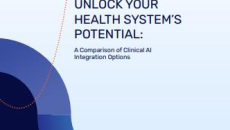Artificial Intelligence
SPONSORED
Reduce administrative burden and seamlessly match patient records.
This resource offers a strategic framework for leaders seeking to implement AI effectively. It provides self-guided tools that walk through crucial steps in the early planning stages, including establishing use cases, assessing partners and gaining consensus.
While a technology plus people plus process-focused strategy is essential for scalable clinical AI, arguably the decision with the largest impact on your short-term needs and long-term infrastructure usability is the AI integration method you choose.
Nursing and IT
Stephen Ferrara, DNP, president of the American Association of Nurse Practitioners and associate dean for AI at Columbia University School of Nursing, talks the role of artificial intelligence for NPs and discusses an AI/wearables use case.
Also, a free virtual women's health clinic is being set up in Victoria.
HIMSS25 sessions looks at an AI-driven approach to reducing wait times and optimizing resource allocation.
A common myth regarding clinical artificial intelligence is that its financial benefits cannot be proven because there is no payor reimbursement. This is an oversimplified perspective that ignores the intrinsic value of enterprise-wide AI.
A physician AI expert and co-principal investigator of the landmark Apple Heart Study says the next wave of AI in healthcare will shift from diagnosing existing conditions to forecasting future health risks, paving the way for proactive and preventive care.
As the White House-backed project seeks to drive the evolution of artificial intelligence computational processes, demand for GPU servers may push the development of lighter-weight machine learning models, says an ICD researcher.
SPONSORED
How medical algorithms calculate risk to detect chronic disease early.










